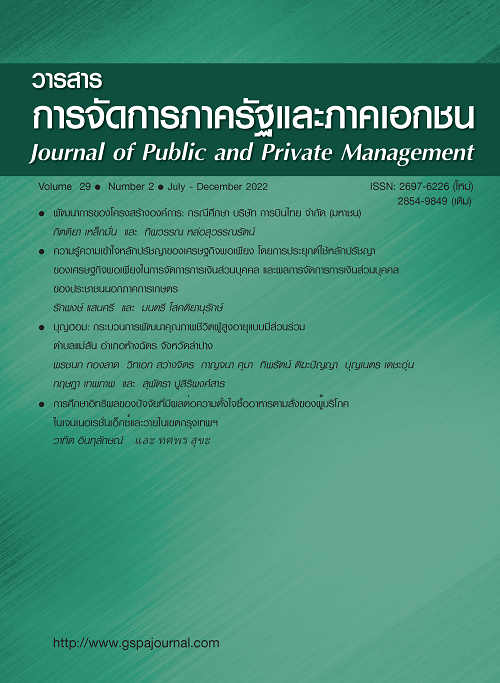Knowledge and Understanding of the Philosophy of the Sufficiency Economy, By Application of the Philosophy of Sufficiency Economy in Personal Finance Management and the Results of Personal Financial Management of Non-Agricultural People
Keywords:
Philosophy of the sufficiency economy, financial management, non-agricultural peopleAbstract
This article studied knowledge and understanding of the philosophy of sufficiency economy, by applying the philosophy of the sufficiency economy in personal financial management and the results of personal financial management of non-agricultural people. In the poverty-stricken provinces in each region are Amnat Charoen province, Chainat province, Pattani province and Mae Hong Son province. The number of samples is 400 samples for a total of 1,600 samples. This article were to study: 1) Analyze direct influences and indirect influences of cognitive factors in the sufficiency economy philosophy and the application factors of sufficiency economy philosophy in managing personal finances with the results of personal financial management 2) Presenting policies to promote the adoption of the philosophy of sufficiency economy applied to sustainable personal finance management. The statistics used for data analysis are frequency, percentage, minimum (Max), Mean (Mean) and standard deviation (S.D.). The results of Goodness of Fit of the Structural Equation Modelling of the effects of understandings towards the philosophy of sufficiency economy, the application of the philosophy of sufficiency economy, and the outcomes of financial management pertaining to the philosophy of sufficiency economy show that the values of Chi-Square and degree of freedom are 1.472 with the p-value of 0.134. Goodness of Fit Index (GFI) was 0.998. Comparative Fit Index (CFI) was 1.000. The value of root mean square residual (RMR) was 0.00174 and root mean square error of approximation was (RMSEA) 0.0173. The research found that 1) Understandings towards the philosophy of sufficiency economy (UNDER) had positive direct effects on the application of the philosophy of sufficiency economy to the management of personal finance (APP) by the regression coefficient values of 0.840 with the 0.01 statistical value. 2) The application of the philosophy of sufficiency economy to the management of personal finance (APP) had positive direct effects on the outcomes of financial management pertaining to the philosophy of sufficiency economy (SUFECO) by the regression coefficient values of 0.863 with the 0.01 statistical value. 3) Understandings towards the philosophy of sufficiency economy (UNDER) had positive direct effects on the outcomes of financial management pertaining to the philosophy of sufficiency economy (SUFECO) by the regression coefficient values of 0.161 with the 0.01 statistical value. 4) Understanding of the Philosophy of Sufficiency Economy (UNDER) had total influenced on the variables of financial management pertaining to the philosophy of sufficiency economy (SUFECO) with a total influence of 0.864 which the 0.01 statistical value. 5) Understandings towards the philosophy of sufficiency economy (UNDER) had indirect effects on the outcomes of financial management pertaining to the philosophy of sufficiency economy (SUFECO) by the regression coefficient values of 0.703 with the 0.01 statistical value. 6) Policies to promote the adoption of the sufficiency economy philosophy to be applied in managing personal finances sustainable. The government and related agencies should promote and promote the public sector to have knowledge and knowledge in the philosophy of sufficiency economy and encourage the public sector to implement correctly in daily life.
Recommendation from this research was the government and related agencies should making policies concerning the philosophy of sufficiency economy clear and continuously and set assessment system to account. The public and private sectors should promote proper knowledge and understanding in the philosophy of the sufficiency economy and able to apply correctly in other areas to achieve success and sustainability.
References
Attakorn, W. (B.E.2553). Settakit Khan Muang Thai 2544-2553 Yuk 5 Nayok. Bangkok: Nam Ping Sai.
Best, J. W., & Kahn, J. V. (1998). Research in Education. 8th ed. Singapore: Allyn and Bacon.
Bloom, B. S. (1971). Mastery learning. In Block, J. H. (Ed.). Mastery Learning: Theory and Practice. New York: Holt, Rinehart & Winston.
Donkwa, K. (B.E.2556). Community Business Management on a Self-Sufficiency Economy. Research Paper, Suranaree University of Technology.
Good, C. V. (1973). Dictionary of Education. New York: McGraw-Hill Book.
Inchumpa, P. (B.E.2554). The Practices on the Sufficiency Economy Philosophy among Employee’s Families in Private Hospitals, Bangkok Metropolitan. Thesis, Mahidol University.
Jantiang, J. (B.E.2558). Business Management and Application of Sufficiency Economy Philosophy in Self-Reliance: A Case Study of Local Fisherfolk in Palian District, Trang. Independent Study, Master of Business Administration, Prince of Songkla University.
Office of the National Economic and Social Development Council. (B.E.2560). Rai Ngan Khan Wikor Satanakhan Kham Yakchon Lae Kwam Liuam Lam Nai Pratet Thai. Bangkok: Office of the National Economic and Social Development Council.
Rangsipaht, S., & Sangtriphetkra, A. (B.E.2557). Means towards Application of Sufficiency Economy Philosophy for Individual and Family Development of Students, Faculty of Agriculture, Kasetsart University.
Spielmann, S., & Cheanmanut, O. (B.E.2516). Chidwittaya Sangkom. Bangkok.
Sridaromont, U., Ngamsanit, S., Banchirdrit, S., & Sriharum, B. (B.E.2556). The management of Thai household economic system based on sufficiency economic philosophy. Rajabhat Maha Sarakham University Journal, 7(3), 83-91.
Srisopha, A. (B.E.2522). Khan Wikor Chud Mung Mai Kong Mahawittayalai Nai Pratet. Bangkok: Wattana Phanit Printing Press Co., Ltd.
Sundaravibhata, T. (2016). Media usage and spending behaviors based on the sufficiency economy among college students in the Bangkok metropolitan, BU Academic Review, 15(1), 137-155.
The Chaipattana Foundation. (B.E.2548). Pratchaya Settakit Phor Phiang. Retrieved June 20, B.E.2561 from http://www.chaipat.or.th/chaipat/content/porpeing/porpeing.html.
Thongpakdee, N. (B.E.2550). Sufficiency economy philosophy: Historical background and interpretation. NIDA Development Journal, 47(1), 1-25.
Virutsetazin, K., & Wimonwatwatee, T. (B.E.2553). The Development of Saving Model Following Philosophy of the Sufficiency Economy on Lifestyle of Undergraduate Students, Faculty of Physical Education, Srinakharinwirot University. Research Paper, Srinakharinwirot University.
Wasi, P. (B.E.2550). Khan Chadkhan Kwam Ru: Krabuankhan Prod Proy Manut Su Seriphab Lae Kwamsuk. Bangkok: Green-Phanyayan.
Yamane, T. (1979). Statistics: An Introductory Analysis. 3rd ed. New York: Harper & Row.
Downloads
Published
How to Cite
Issue
Section
License

This work is licensed under a Creative Commons Attribution-NonCommercial-NoDerivatives 4.0 International License.



